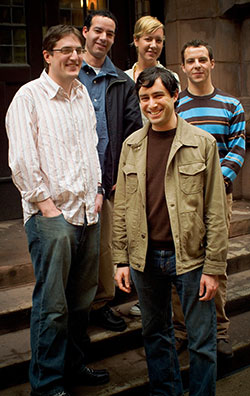Pop Goes The Culture
In a recent episode of the animated television show South Park, Kenny-the character known for dying during each episode-played a role mirroring the much publicized Terry Schiavo quality-of-life debate. It aired on the day of Schiavo's death.
The show, a favorite among high school and college students, is known for its politically incorrect references to current events. In today's culture, is this brand of television entertainment a legitimate part of education? Should it be? Past Teachers College President Lawrence Cremin, in an essay called "Popular Culture and Pop Education," called for an end to the view that popular culture is the enemy of education.
"Today, the dominant approach is the suspicion that pop culture is warping the minds of the young and immersing them in sex and violence and that you shouldn't trust the media," says Professor John Broughton, who teaches classes in cultural studies at TC. "But that's disinformation. Instead, we need to teach young people to be skeptical and critical about popular culture."
In that vein, five students from programs across the TC spectrum, most of whom met in Broughton's classes-Audra DiPadova, Steve Zemke, Cyrille Adam, David Shaenfield and postdoc Ben Frymer-conceived and organized Cultural Studies Matters. The two-day conference brought together 150 participants for a variety of workshops covering youth culture, media studies, music, classroom theory, film, race and ethnicity. "We contend that cultural studies is not just an important intellectual endeavor, but is a field that has also had a significant impact on the practice of education, and therefore ought to be supported in institutions like TC that focus on the preparation of educational practitioners and researchers alike," reads the conference program.
"The idea started as a one-day conference," said coordinator Audra DiPadova. The chief goal was to have Douglas Kellner, Chair of Philosophy and Education at UCLA, give a keynote speech. As interest widened and grant money and other financial support became available to the students, the event grew from its initial concept of a local gathering to an international academic conference and one-credit course sponsored by the Center for Educational Outreach and Innovation.
Once Kellner accepted, the next target was his friend Stanley Aronowitz, a distinguished professor of sociology and Director of the Center for the Study of Culture, Technology and Work at the CUNY Graduate Center. Ultimately, three other keynote speakers accepted, as well as Donna Gaines, author of Teenage Wasteland; Alissa Quart, author of Branded: The Buying and Selling of Teenagers; and Cameron McCarthy, Research Professor, Communications Scholar and University Scholar in the Institute of Communication Research at the University of Illinois, who gave the culminating keynote entitled, "The Work of Art in the Postcolonial Imagination: Rethinking the Center-Periphery Thesis."
A call for papers brought 90 submissions from graduate students and professionals in the fields of cultural studies and education. "The focus on education was important because our goal was not just to legitimize cultural studies but to show why it is important in education," said coordinator Cyrille Adam, a Philosophy and Education student.
Presentations included Marc Leverette's paper, "South Park as Cultural Studies Praxis," which Leverette uses in teaching his classes at Rutgers. Others explored issues such as the image of Ch Guevara in popular culture and the hegemony of Disney's "The Lion King."
The organizers said they are working to produce a book based on presentations at the conference. They also hope to put out a DVD featuring the keynote speakers.
The success of the conference showed the need to direct attention to cultural studies and the need for a cultural studies program at institutions like TC, said Adam, adding, "We hope the next cultural studies conference at TC will celebrate the birth of such a program here."
Published Thursday, Jun. 23, 2005
